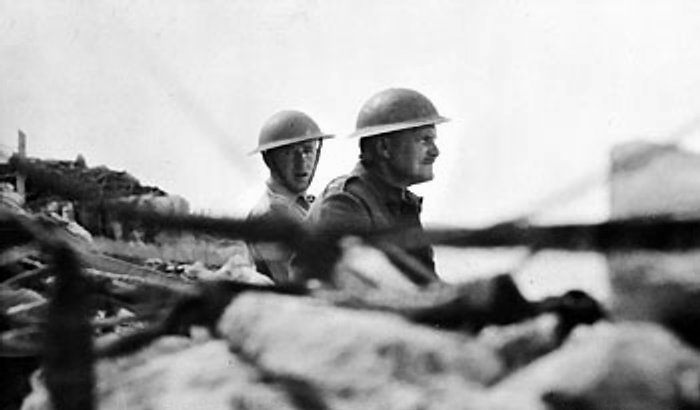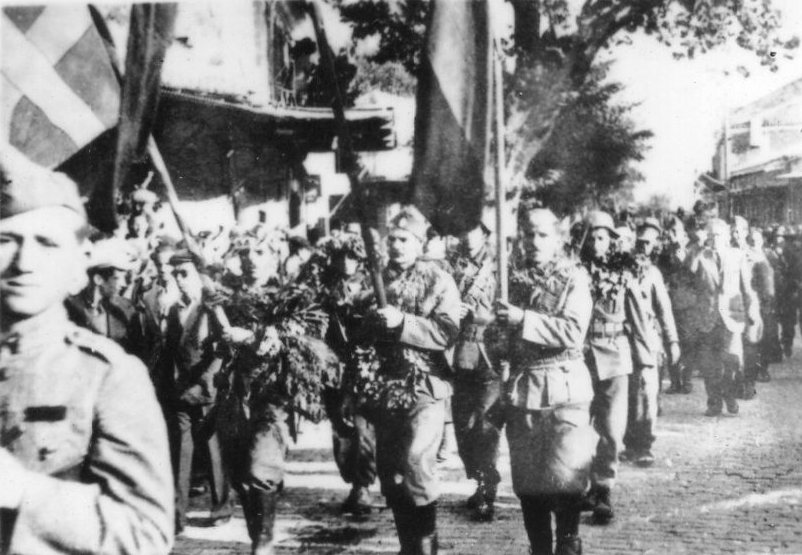|
National Organization Of Crete
The National Organization of Crete ( el, Εθνική Οργάνωση Κρήτης, ''Ethnikí Orgánosi Krítis'' (EOK)) was a resistance organization established in the island of Crete with the cooperation and encouragement of British Intelligence during the Axis occupation of Greece in World War II. Establishment and ideology EOK was established in June 1943 with the aid of Tom Dunbabin, then SOE Field Commander on Crete. Predominantly Venizelist in sympathy and with members ranging from centre-left to right-wing, EOK was meant to act as a counterweight to the pro-communist EAM resistance organization. EOK evolved from the secret organization AEAK ( el, Ανώτατη Επιτροπή Αγώνα Κρήτης, "Supreme Committee of Cretan Struggle"), that was established in Chania on June 15, 1941. AEAK was founded a mere two weeks after the end of the Battle of Crete by patriots Andreas Papadakis, Ioannis Paizis, Andreas Polentas, Titos Georgiadis and Ioannis Ioannidis. It ... [...More Info...] [...Related Items...] OR: [Wikipedia] [Google] [Baidu] |
EAM-ELAS
The Greek People's Liberation Army ( el, Ελληνικός Λαϊκός Απελευθερωτικός Στρατός (ΕΛΑΣ), ''Ellinikós Laïkós Apeleftherotikós Stratós'' (ELAS) was the military arm of the left-wing National Liberation Front (EAM) during the period of the Greek resistance until February 1945, when, following the '' Dekemvriana'' clashes and the Varkiza Agreement, it was disarmed and disbanded. ELAS was the largest and most significant of the military organizations of the Greek resistance. Birth of ELAS After Nazi Germany attacked the Soviet Union with the initiation of Operation Barbarossa (June 22, 1941) — with most of Greece having fallen under Axis occupation since April and the Battle of Crete having ended on June 1 — the Greek Communist Party (KKE) called for national resistance. The KKE, together with minor parties of the Left, formed a political structure called the National Liberation Front. They were joined by other center-left o ... [...More Info...] [...Related Items...] OR: [Wikipedia] [Google] [Baidu] |
Colonel
Colonel (abbreviated as Col., Col or COL) is a senior military officer rank used in many countries. It is also used in some police forces and paramilitary organizations. In the 17th, 18th and 19th centuries, a colonel was typically in charge of a regiment in an army. Modern usage varies greatly, and in some cases, the term is used as an honorific title that may have no direct relationship to military service. The rank of colonel is typically above the rank of lieutenant colonel. The rank above colonel is typically called brigadier, brigade general or brigadier general. In some smaller military forces, such as those of Monaco or the Vatican, colonel is the highest rank. Equivalent naval ranks may be called captain or ship-of-the-line captain. In the Commonwealth's air force ranking system, the equivalent rank is group captain. History and origins By the end of the late medieval period, a group of "companies" was referred to as a "column" of an army. According to Raym ... [...More Info...] [...Related Items...] OR: [Wikipedia] [Google] [Baidu] |
Greece
Greece,, or , romanized: ', officially the Hellenic Republic, is a country in Southeast Europe. It is situated on the southern tip of the Balkans, and is located at the crossroads of Europe, Asia, and Africa. Greece shares land borders with Albania to the northwest, North Macedonia and Bulgaria to the north, and Turkey to the northeast. The Aegean Sea lies to the east of the mainland, the Ionian Sea to the west, and the Sea of Crete and the Mediterranean Sea to the south. Greece has the longest coastline on the Mediterranean Basin, featuring thousands of islands. The country consists of nine traditional geographic regions, and has a population of approximately 10.4 million. Athens is the nation's capital and largest city, followed by Thessaloniki and Patras. Greece is considered the cradle of Western civilization, being the birthplace of democracy, Western philosophy, Western literature, historiography, political science, major scientific and mathematical p ... [...More Info...] [...Related Items...] OR: [Wikipedia] [Google] [Baidu] |
Andreas Polentas
Andreas Polentas (1908 – 23 December 1942) was a Greek partisan executed by the Germans during the Axis occupation of Greece in World War II. Fielding, Xan. ''Hide and Seek: The Story of a War-Time Agent'', Paul Dry Books, 2013, Early Years Andreas Polentas was born in 1908 in Sfakia, Crete to parents Pavlos Polentas and Anna Mpolioti. His father was a merchant and around 1915 he moved with his family to Vryses. Polentas graduated with honors from Vamos High School and then enrolled in the Law School of Athens.M. Xanthoudakis, Speech about Andreas Polentas, Vryses 23-11-1996 (in Greek). Although an admirer of |
Battle Of Crete
The Battle of Crete (german: Luftlandeschlacht um Kreta, el, Μάχη της Κρήτης), codenamed Operation Mercury (german: Unternehmen Merkur), was a major Axis airborne and amphibious operation during World War II to capture the island of Crete. It began on the morning of 20 May 1941, with a multiple German airborne landings on Crete. Greek and other Allied forces, along with Cretan civilians, defended the island. After only one day of fighting, the Germans had suffered heavy casualties and the Allied troops were confident that they would defeat the invasion. The next day, through communication failures, Allied tactical hesitation, and German offensive operations, Maleme Airfield in western Crete fell, enabling the Germans to land reinforcements and overwhelm the defensive positions on the north of the island. Allied forces withdrew to the south coast. More than half were evacuated by the British Royal Navy and the remainder surrendered or joined the Cretan resistan ... [...More Info...] [...Related Items...] OR: [Wikipedia] [Google] [Baidu] |
Supreme Committee Of Cretan Struggle
The Supreme Committee of Cretan Struggle ( el, Ανωτάτη Επιτροπή Αγώνος Κρήτης, A.E.A.K.) was a resistance organization founded in Crete in June 1941. It was the first armed resistance organization founded in Greece after its occupation by the Axis powers and was a precursor to the National Organization of Crete (EOK). Establishment AEAK was founded in Chania on June 15, 1941, just two weeks after the end of the Battle of Crete and the occupation of the island by the Germans. Its founding members were Ioannis Paizis, M.D. from Chania prefecture, Col. Andreas Papadakis (a veteran of the Asia Minor campaign) from the prefecture of Rethymno, lawyers Titos Georgiadis and Ioannis Ioannidis from the prefectures of Heraklion and Lassithi prefecture, and Andreas Polentas as secretary general. The Chairman of the Court of Appeals of Crete, Aristomenis Karakoulakis, joined the steering committee of the organization. AEAK was Venizelist in ideology. Some of its f ... [...More Info...] [...Related Items...] OR: [Wikipedia] [Google] [Baidu] |
National Liberation Front (Greece)
The National Liberation Front ( el, Εθνικό Απελευθερωτικό Μέτωπο, ''Ethnikó Apeleftherotikó Métopo'' (EAM) was an alliance of various political parties and organizations which fought to liberate Greece from Axis Occupation. It was the main movement of the Greek Resistance during the occupation of Greece. Its main driving force was the Communist Party of Greece (KKE), but its membership throughout the occupation included several other leftist and republican groups. ΕΑΜ became the first true mass social movement in modern Greek history. Its military wing, the Greek People's Liberation Army (ELAS), quickly grew into the largest armed guerrilla force in the country, and the only one with nationwide presence. At the same time, from late 1943 onwards, the political enmity between ΕΑΜ and rival resistance groups from the centre and right evolved into a virtual civil war, while its relationship with the British and the British-backed Greek governmen ... [...More Info...] [...Related Items...] OR: [Wikipedia] [Google] [Baidu] |
Right-wing Politics
Right-wing politics describes the range of political ideologies that view certain social orders and hierarchies as inevitable, natural, normal, or desirable, typically supporting this position on the basis of natural law, economics, authority, property or tradition.T. Alexander Smith, Raymond Tatalovich. ''Cultures at war: moral conflicts in western democracies''. Toronto, Canada: Broadview Press, Ltd, 2003. p. 30. "That viewpoint is held by contemporary sociologists, for whom 'right-wing movements' are conceptualized as 'social movements whose stated goals are to maintain structures of order, status, honor, or traditional social differences or values' as compared to left-wing movements which seek 'greater equality or political participation.' In other words, the sociological perspective sees preservationist politics as a right-wing attempt to defend privilege within the ''social hierarchy''."''Left and right: the significance of a political distinction'', Norberto Bobbio a ... [...More Info...] [...Related Items...] OR: [Wikipedia] [Google] [Baidu] |
Centre-left
Centre-left politics lean to the left on the left–right political spectrum but are closer to the centre than other left-wing politics. Those on the centre-left believe in working within the established systems to improve social justice. The centre-left promotes a degree of social equality that it believes is achievable through promoting equal opportunity.Oliver H. Woshinsky. ''Explaining Politics: Culture, Institutions, and Political Behavior''. New York: Routledge, 2008, pp. 143. The centre-left emphasizes that the achievement of equality requires personal responsibility in areas in control by the individual person through their abilities and talents as well as social responsibility in areas outside control by the person in their abilities or talents. The centre-left opposes a wide gap between the rich and the poor and supports moderate measures to reduce the economic gap, such as a progressive income tax, laws prohibiting child labour, minimum wage laws, laws regulating ... [...More Info...] [...Related Items...] OR: [Wikipedia] [Google] [Baidu] |
Thomas Dunbabin
Thomas James Dunbabin DSO (12 April 1911 – 31 March 1955), was an Australian classicist scholar and archaeologist of Tasmanian origin, as well as a renowned WWII soldier in Crete. Early life He was born in Hobart, Tasmania, on 12 April 1911. His father was Thomas Dunbabin (1883–1973), a distinguished journalist and a contributor to ''Walkabout''. He attended Sydney Church of England Grammar School where he won the Cooper Prize and was a school prefect. He shared the Burke Prize for highest general proficiency in his school in 1926 and in that year achieved first class honours in English, Latin and Greek. He studied at the University of Sydney and then moved to Corpus Christi College, Oxford. There, he won the Haigh prize and was eventually appointed Reader in Classical Archaeology and Fellow of All Souls College, specializing in the Greek colonization in Italy.Dunbabin, Thomas J. ''The Western Greeks : the history of Sicily and south Italy from the foundation of the Gree ... [...More Info...] [...Related Items...] OR: [Wikipedia] [Google] [Baidu] |


